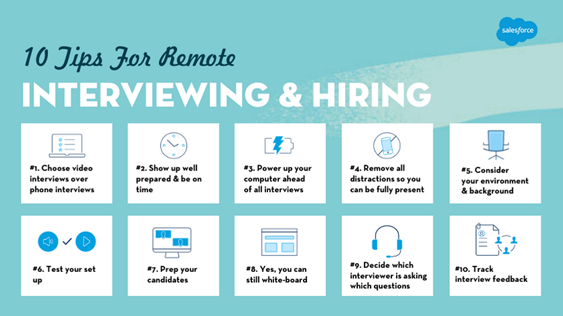Interview Tips – The Most Common Mistakes You Might Make When An Interview Gets Under Way
Share Our Insights With Other IT Professionals
Do you want to ace your interview and land the position of your dreams? Interviewing can be stressful and terrifying, but it does not have to be. If you prepare correctly and use these easy interview tips, you can ace the interview and make a good first impression on your potential employer.
First impressions mean everything – you only get one chance to make a good first impression, so do not even think about trying to impress your potential employer by doing anything too ‘smooth’.
Take a look at these tips for remote interviewing (which has become the new norm for interviewing)

Preparation
Preparation is the key to success when interviewing for a job. This means thoroughly researching the company before the interview, reviewing what you would like to bring with you on the day of the interview, making a list of appropriate questions you would like to ask the interviewer, and practising your interview questions with friends and family.
Interview tips for preparing for an interview include thoroughly researching the organization you are applying for, reviewing job descriptions, reading company blogs and press releases to get an idea of their business model, checking out company websites to see if they have professional pictures of their leaders and current employees, and reviewing any literature available on the organization’s website regarding the company culture, mission, and goals.
A thorough understanding of the company, as well as the industry in which you wish to work, are also very important when it comes to preparing for a job interview.
When you have done your research, you will be able to answer interview questions effectively and know more about the organization than the interviewer.
Questions
It is a good idea to formulate answers to interview questions you do not feel comfortable asking during the actual interview, which you can then modify to the interviewer.
By rehearsing your answers, you will sound more confident to the interviewer. Preparing in advance will also give you time to mentally prepare for the questions that the interviewer may ask you.
Eye Contact
Try to maintain eye contact with the interviewer throughout the interview. Eye contact is a key element in communicating with people. If you do not maintain strong eye contact, people will assume that you do not want to meet with them.
Strong eye contact is also essential when asking questions, so that the interviewer is aware of your need for information. Maintaining eye contact will also show the interviewer that you respect him or her, which are both important qualities to look for in an employer.
Body Language
The best way to present yourself is to develop your body language. When sitting down to interview, if you do not sit tall in your chair, your shoulders should be kept in shape, and your hands should be at your sides.
The way you sit, the tone you use with your voice, and even the way you carry yourself can all be indicators of your body language, which you should be using when meeting with potential employers.
Company Values
It is important to remember that an interviewer is looking not only for how well you can answer the question, but also for how well you fit into the organization.
An interviewer may be looking to select someone that shares the same values that he or she does.
Emotional Intelligence
Emotional intelligence is another one of the most important competencies that an interviewer will be looking for. An interviewer will generally look for someone who displays good social skills, a sense of humor, a sense of fairness, a solid work ethic, and an overall sense of professionalism.
Because everyone is different, it is important that you find common ground on which you can build your strengths. People with high levels of emotional intelligence tend to be successful in any job that they apply to.
It is also important to remember that most interviews are conducted by just you and the interviewer. No one is checking your facts or trying to find commonalities with you.
So, if you need to find common ground, try to match your descriptions of your expertise on the job to some of the things that you have learned about previously. Sometimes, all you have to do is match your experiences to what the interviewer has said.
At Lucid Support & Lucid Connect, we recruit candidates for technical based roles. You can look at our listed jobs by clicking here.
Written by Lucid Support